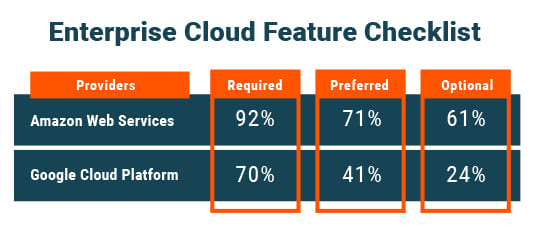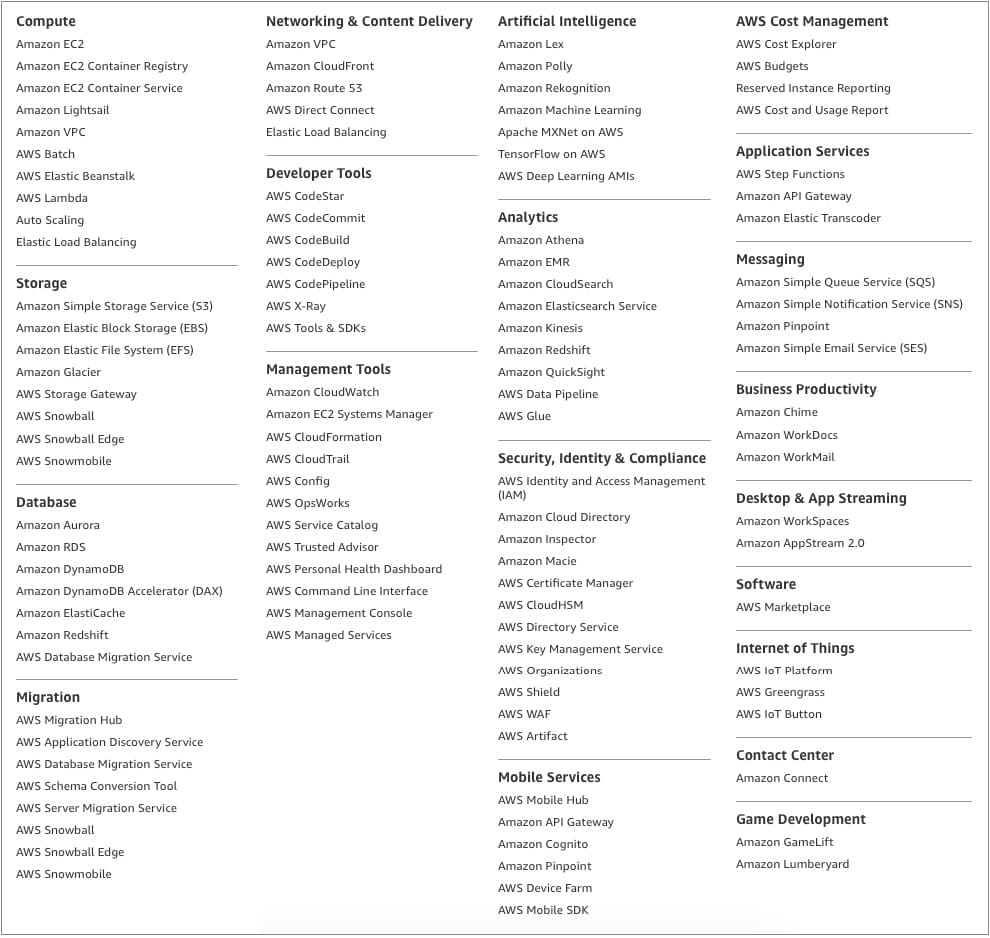AWS vs. Google Cloud Platform: which cloud service provider to choose
-
8305
-
0
-
0
-
0
While AWS is undoubtedly the benchmark of cloud service quality, it has some drawbacks we described when comparing AWS vs MS Azure. Today we compare Amazon Web Services (AWS) with Google Cloud Platform (GCP).
AWS definitely is the leader of the cloud computing services, due to being the pioneer in the IaaS industry since 2006 and being 5 years ahead of other popular cloud service providers. However, this leads to certain inconveniences and drawbacks that can be exploited by the competition. Essentially, the sheer amount of AWS services is overwhelming.
While Google Cloud Platform does not boast such an ample list of services, it rapidly adds new products to the table. The important thing to note is that while AWS does offer a plethora of services, many of them are niche-oriented and only a few are essential for any project. And for these core features, we think Google cloud is a worthy competitor, even a hands-down winner sometimes, though many of essential features, like PostgreSQL support are still in beta in GCP.
Look for yourselves. Google Cloud can compete with AWS in the following areas:
- Cost-efficiency due to long-term discounts
- Big Data and Machine Learning products
- Instance and payment configurability
- Privacy and traffic security
Long-term discounts: begin with 1 month, not 1 year
Customer loyalty policies are essential as they help the customers get the most of each dollar, thus improving commitment. However, there is an important difference here: AWS provides discounts only after signing for a 1-year term and paying in advance, without the right to change the plan. This, obviously, is not the perfect choice, as many businesses adjust their requirements dynamically, not to mention paying for a year in advance is quite a significant spending.
GCP provides the same flexibility, namely the sustained-use discounts, after merely a month of usage, and the discount can be applied to any other package, should the need for configuration adjustment arise. This makes long-term discount policy from GCP a viable and feasible alternative to what AWS offers, and rather an investment, not an item of expenditure. Besides, you avoid vendor lock-in and are free to change the provider if need be, without losing all the money paid in advance.
Big Data and Machine Learning products
AWS is definitely the leader for building Big Data systems, due to in-depth integration with many popular DevOps tools like Docker and Kubernetes, as well as providing a great solution for serverless computing, AWS Lambda, which is a perfect match for short-time Big Data analysis tasks.
At the same time, GCP is in possession of the world’s biggest trove of Big Data from Google Chrome, which supposedly deals with more than 2 trillion searches annually. Having access to such a goldmine of data is sure to lead to developing a great kit of products, and Bigquery is definitely such a solution. It is capable of processing huge volumes of data rapidly, and it has a really gentle learning curve for such a feature-packed tool (it even produces real-time insights on your data). The best thing about it is that Bigquery is really user-friendly and can be used with little to none technical background, not to mention $300 credit for trying out the service.
Instance and payment configurability
As we explained in our article on demystification of 5 popular Big Data myths, cloud computing can be more cost-efficient as compared to maintaining on-prem hardware. Essentially, this really goes down to using the resources optimally and under the best billing scheme. AWS, for example, uses prepaid hourly billing scheme, which means running a 1 hour and 5 minute-long task would cost 2 full hours.
In addition, while AWS offers a plethora of various EC2 virtual machines under several billing approaches, these configurations are not customizable. This means if your task demands 1.4GB RAM, you have to go with the 2GB package, meaning you are overpaying. Of course, there are several ways to save money with Amazon, from bidding for Spot instances to lending Reserved instances and opting for per-second billing. Unfortunately, the latter option is currently available only for Linux VM’s.
GCP, on the contrary, offers per-second billing as an option for ALL their virtual machines, regardless of the OS’s they run on, starting 26th of September 2017. What’s even more important, their instances are fully configurable, so the customers can order 1 CPU and 3.25GB RAM, or 4.5GB, or 2.5GB — you get the meaning.
Privacy and traffic security
As The Washington Post told us, NSA has infiltrated the data center connections and eavesdropped on Google once (many more times, supposedly). This breach has lead to Google opting for full-scale encryption of all their data and communication channels. Even the stored data is encrypted, not to mention the traffic between data centers.
AWS is still lagging in this regard. Their Relational Database Service (RDS) does provide data encryption as an option, yet it is not enabled by default and requires intense configurations if multiple availability zones are involved in the equation. The inter-data center traffic is also not encrypted by AWS as of now, which poses yet another potential security threat.
Final thoughts
All things considered, GCP is actually a serious contestant for both AWS and MS Azure. Yes, AWS leads in terms of the numbers of customers and products, due to 5 years of head start. At the same time, GCP already provides all the needed functionality and offers competitive pricing and configuration models, backed up by serious traffic privacy and security measures. With time, as more and more businesses accept the AI-first approach to doing business, GCP’s immense power in Big Data analytics and Google Chrome’s leading position amongst the browsers will allow Google Cloud Platform become an even more serious counterpart for AWS.
Just keep in mind many of GCP features are in alpha or beta stage, so their behavior and API might change. It means that using GCP in conjunction with long-term projects may require GCP connectors upgrade during the project lifetime.
We highly recommend evaluating the actual requirements of your project and think GCP is the best choice for development and staging environments. It might turn out you will suffice to go for GCP to meet all your needs and avoid opting for multiple AWS services required to use the platform efficiently but not actually needed to run your project. Feel free to contact us with any questions regarding the project requirements, we are always ready to assist!



